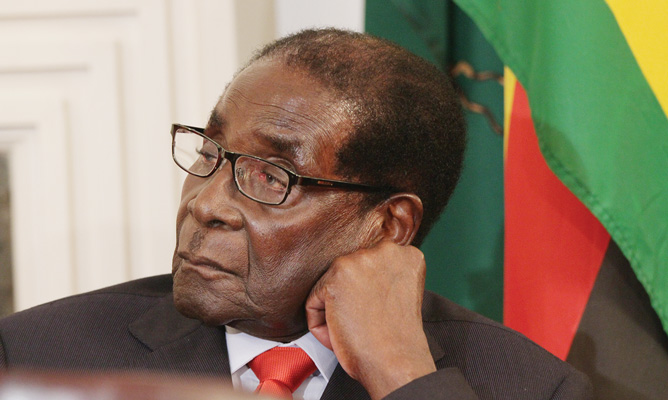
AS news filtered at Chikurubi Maximum Prison that President Robert Mugabe had pardoned hundreds of convicted criminals, incarcerated Johanne Masowe eChishanu apostolic sect leader Ishmael Chokurongerwa was eager to know if his stay in jail had been cut short.
BY BLESSED MHLANGA
Chokurongerwa, popularly known as Madzibaba Ishmael, gained infamy after he and fellow church members ran amok and attacked riot police, members of the Apostolic Christian Council of Zimbabwe and journalists at their Budiriro shrine in 2014.
Madzibaba Ishmael on Wednesday stood next to the main entrance as journalists entered the prison complex for the official announcement of the amnesty.
He was eager to know if his four-year jail term was going to be cut short following the announcement.
“Do I qualify for the amnesty? Will I be going home today?” he asked as members of the media jostled to take pictures of him and to have a word with him.
Unfortunately for him, Madzibaba Ishmael was not among these 2 000 covered by the amnesty, which did not include habitual criminals, those accused of rape, murder, treason and violence-related crimes. The news (of his exclusion) was received with disbelief by some of his followers who had gathered at the prison complex with the hope of welcoming him back to freedom.
However, it was a different story for Gladys Mupfumi (18), a former maid convicted of theft after stealing property worth $2 300 from her employer Tawanda King in Rusape.
- Chamisa under fire over US$120K donation
- Mavhunga puts DeMbare into Chibuku quarterfinals
- Pension funds bet on Cabora Bassa oilfields
- Councils defy govt fire tender directive
Keep Reading
Mupfumi spoke of a torrid time in detention and vowed to make good of the amnesty.
“I still had six months to serve and I have been granted clemency, but I should say jail-time is not a stroll in the park, the food here is bad, we were fed on porridge without sugar and sadza with vegetables,” she said.
The inmates said they were served three meals a day, which included porridge and two servings of sadza in the afternoon and evening without meat.
Another inmate from the female prison, Bandaro Chemandaita (37), who was supposed to leave prison in 2020 after she was jailed for robbery, was also free by end of day on Africa Day following the pardon.
Her gang of two females and four men was nabbed by police in 2014. While she was able to go home after the pardon, her male counterparts remain in prison.
Chemandaita said after enduring beatings at the hands of prison wardens and a not so attractive diet, there was no way she would ever engage in crime again.
“If one person committed an offence they would not punish just that one person, they would beat everyone in the compound, we were all punished and beaten up with baton sticks. It is by no means a life I would want to face again,” she said.
Loice Paungana, who served just one year of a 15-year jail term for murder, was so ecstatic about the pardon, which left all female prisons almost empty.
Paungana claimed she was forced to kill her own child in an attempt to keep her second marriage because her new husband did not want the child.
Her husband abandoned her following her conviction and sentence. She was unsure of what awaited her back home.
“He used to visit while I was in remand prison, but after my conviction and transfer to Chikurubi Female Prison, he never bothered to visit or check on me. I will therefore never commit any crime for love,” Paungana said.
Mugabe pardoned all male prisoners who were under the age of 18 regardless of offences committed. Those over the age of 60 who had served two thirds of their prison terms and all prisoners in open prison were also pardoned.
Terminally-ill prisoners who are unlikely to survive their prison terms were pardoned regardless of offences.
Zimbabwe Prisons and Correctional Service (ZPCS) acting public relations officer Superintendent Priscilla Mthembo said the move would decongest over-populated jails, but denied the food crisis allegations.
“We have enough food for our inmates and this pardon is not motivated by that. The president has powers in the Constitution to issue such a pardon,” she said.
Mthembo called on communities not to shun the former inmates, but to assist them reintegrate into society so that they do not find their way back to prison.
However, a National Prosecuting Authority official who requested anonymity said the pardon on all female prisoners was a slap in the face of justice.
“We work hard to ensure that criminals are sent to prison and rehabilitated, justice is served when one serves their time and pays their dues to society,” he said.
“But some people who stole over $300 000 in fraud did not even spend three days in prison, it’s a slap in the face of justice.”
Some of the pardoned inmates were reportedly already in trouble with the law, among them Khupekani Sibanda (32) who was arrested a day after he was released for attempting to buy clothes using fake United States dollars.
Sibanda was arrested in Bulawayo after he was found in possession $1 200 in fake notes.
He appeared before Bulawayo magistrate Evelyn Mashavakure on Friday charged with possession of articles for criminal use. He was remanded to June 3 for trial and granted $50 bail.











